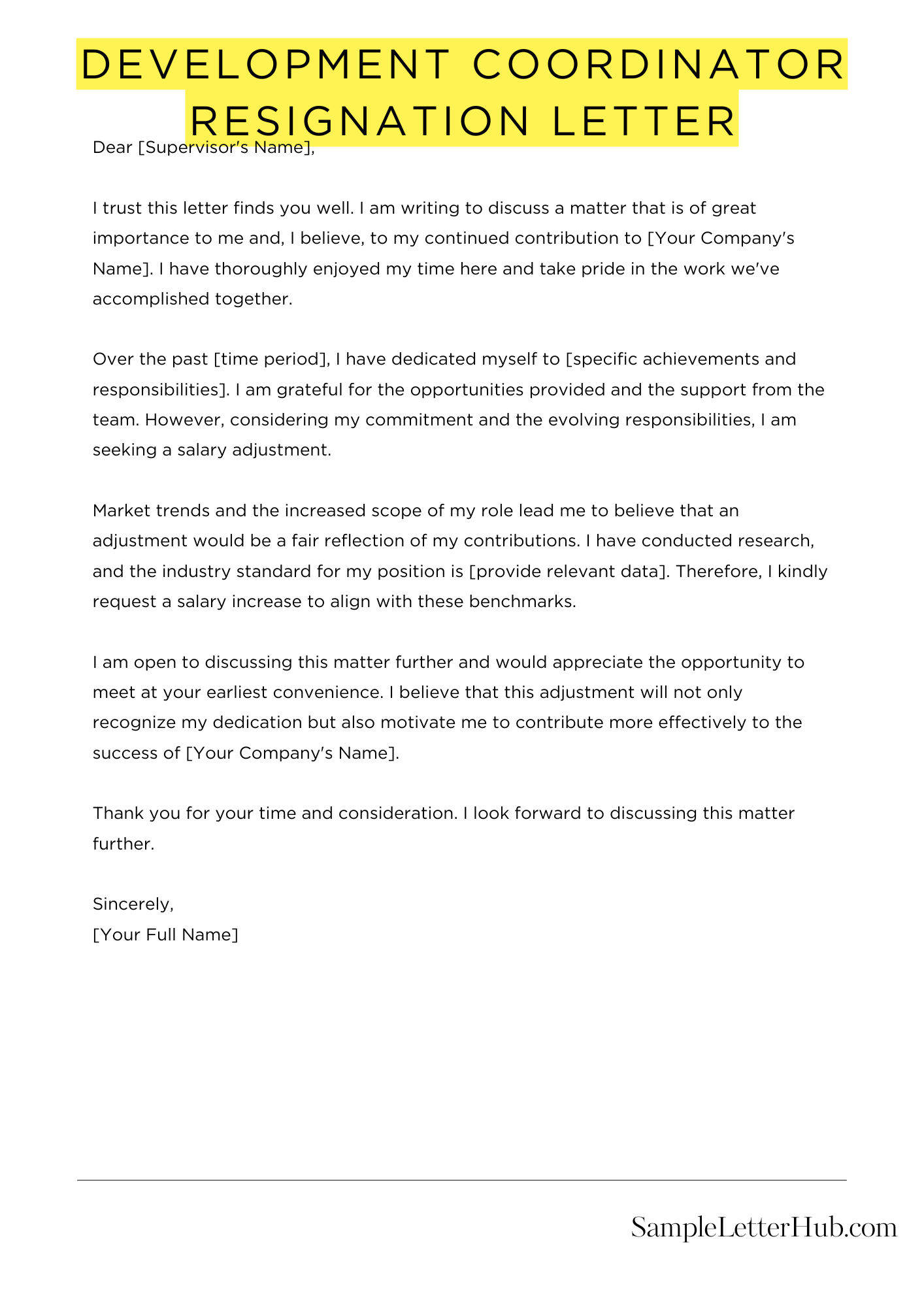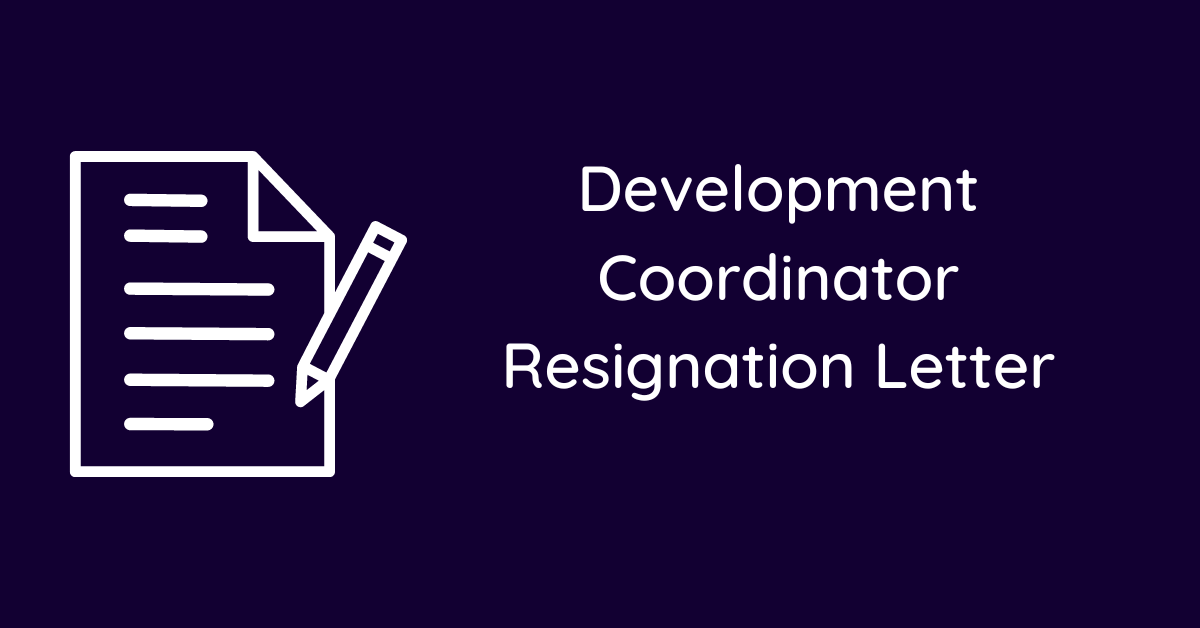Are you a development coordinator who’s ready to bid farewell to your current role? Crafting a development coordinator resignation letter is a crucial step in your professional journey. We’ll share an example letter to guide you.
When it comes to leaving a job, a well-written resignation letter is essential. It’s your chance to express your gratitude, explain your decision, and leave a positive impression. Be polite, humble, and professional in your tone. Remember, it’s not just about informing your employer; it’s also about maintaining a good relationship.
Below, we’ve included a sample development coordinator resignation letter that you can tailor to your specific situation. Use it as a starting point to create a letter that reflects your unique experience and aspirations.
Development Coordinator Resignation Letter
Dear [Recipient Name],
Please accept this letter as formal notification that I will be resigning from my position as Development Coordinator at [Organization Name], effective [Last Date of Employment].
I have enjoyed my time at [Organization Name] and am grateful for the opportunities I have been given. I have learned a great deal and have made many valuable connections.
I wish you and [Organization Name] all the best in the future.
Sincerely,
[Your Signature]
Short Development Coordinator Resignation Letter Sample
Please accept this letter as formal notification that I am resigning from my position as Development Coordinator at [Company Name]. My last day of employment will be [Your Last Day]. Thank you for the opportunity to grow and learn during my time here. I wish you and the company continued success. I am happy to assist in the transition process to ensure a smooth handover of my responsibilities.
I wish you all the best with your development coordinator resignation letter.
When it’s time to say farewell, expressing your gratitude and best wishes can make the transition smoother:

How to Write a Development Coordinator Resignation Letter
1. Begin with a Formal Introduction
Start your letter with a formal salutation, addressing the recipient by their name and title. Clearly state your intention to resign from your position as Development Coordinator. Indicate your last date of employment.
2. Express Gratitude and Appreciation
Take this opportunity to express your gratitude for the opportunity to work at the organization. Highlight specific experiences or accomplishments that you’re particularly thankful for. This shows that you value the time you’ve spent there.
3. State Your Reasons for Leaving
While it’s not necessary to go into excessive detail, you can briefly mention your reasons for leaving. This could include pursuing a new opportunity, relocating, or seeking a different career path. Be professional and avoid any negative or critical remarks.
4. Offer Assistance with the Transition
Let your employer know that you’re willing to help with the transition during your notice period. Offer to train your replacement or assist with any ongoing projects. This shows that you’re committed to leaving the organization in a good position.
5. End with a Positive Note
Close your letter with a positive and professional tone. Reiterate your appreciation for the opportunity and wish the organization well in the future. Keep it brief and to the point.
6 Most Frequently Asked Questions About Development Coordinator Resignation Letters
Development coordinators play a vital role in the success of nonprofit organizations. They are responsible for fundraising, grant writing, and managing donor relationships. When a development coordinator resigns, it can be a major disruption to the organization. That’s why it’s important to write a well-crafted resignation letter that is professional, respectful, and informative.
Here are the six most frequently asked questions about development coordinator resignation letters:
1. What should I include in my resignation letter?
Your resignation letter should include the following information:
- Your name and contact information
- The date
- The name of the organization you are resigning from
- Your position
- Your last date of employment
- A brief statement of your reasons for resigning
- An offer to help with the transition
- A thank you for the opportunity to work at the organization
2. How should I format my resignation letter?
Your resignation letter should be formatted in a professional business letter format. It should be single-spaced, with one-inch margins on all sides. Use a standard font, such as Times New Roman or Arial, in 12-point size.
3. What should I say in my resignation letter?
The tone of your resignation letter should be professional and respectful. You should be clear and concise in your language, and you should avoid using negative or emotional language.
In your letter, you should briefly state your reasons for resigning. You do not need to go into great detail, but you should give the organization a general idea of why you are leaving.
You should also offer to help with the transition. This could involve training your replacement, helping to write job descriptions, or providing other assistance.
Finally, you should thank the organization for the opportunity to work there. You should express your appreciation for the experience and the people you have worked with.
4. When should I submit my resignation letter?
It is generally advisable to submit your resignation letter two weeks before your last date of employment. This will give the organization time to find a replacement and make other necessary arrangements.
However, there may be circumstances where you need to give more or less notice. For example, if you are leaving for a new job that starts immediately, you may only be able to give a few days’ notice.
5. What if I am not sure what to say in my resignation letter?
If you are not sure what to say in your resignation letter, you can consult with a career counselor or human resources professional. They can help you to write a letter that is professional, respectful, and informative.
6. What should I do after I submit my resignation letter?
After you submit your resignation letter, you should continue to perform your job duties to the best of your ability. You should also be willing to help with the transition in any way that you can.
On your last day of employment, you should return all company property, such as your laptop, cell phone, and keys. You should also clean out your desk and say goodbye to your colleagues.
Before making the decision to resign from your job, it’s essential to consider the legal aspects:
Understanding your emotions after quitting your job is important. Explore why you might be feeling sad:
Related
- Resignation letter sample
- Forced resignation letter
- Resignation letter due to going abroad
- Resignation letter due to marriage
- Resignation letter due to other opportunity
- Resignation letter due to mistake

